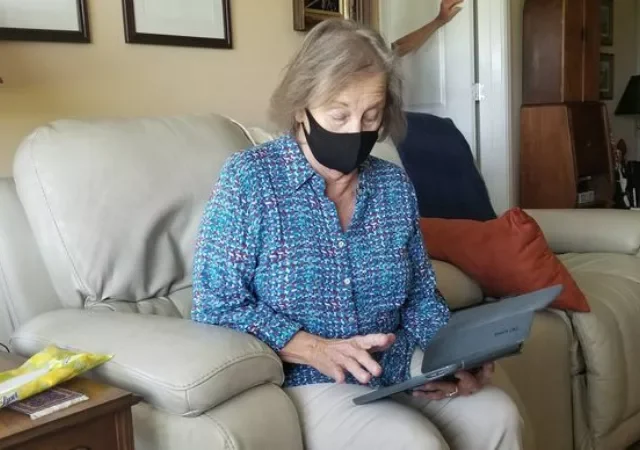They jumped from a two-engine turboprop plane 14,000 feet up, way above the clouds. They were free falling at a rate of 100 miles per hour until their chutes opened and landed them gently on the ground. They want to do it again.
They are in their late 80s.
Other older adults in the news have graduated college, climbed mountains, competed in marathons, created inventions, and…well, the sky’s the limit as to what seniors are doing.
Besides a good dose of fun and, in some cases adrenaline-pumping exhilaration, trying different things later in life has many advantages. While seniors may be more reticent to go out on a limb than other age groups, the plusses of experimenting with new activities far outweigh the minus of a learning curve at any age. And one doesn’t have to go as far as jumping out of a plane to
reap the multiple benefits of doing unexpected things.
Technology Opens the World
Technology is here to stay, advancing by the day. The old ways of keeping in touch have gone largely by the wayside. Seniors who want to communicate with their grandchildren must reach them where they live through text messaging and social media. Older adults who learn to discover and communicate electronically are realizing the world is literally at their fingertips.
More and more, seniors are becoming familiar and comfortable with technology such as social media, email, Skype and surfing the web. At GreenFields of Geneva, residents have seen the benefits of technology-up close and personal.
On a visit to a “selfie studio” in Bloomingdale, residents had great fun taking selfies with various props and backdrops. Young instructors showed them how to use their phones to capture images of themselves, which inspired a good dose of laughter and levity along with the learning.
In a program called Exploring the World Our Way (eWOW), residents experience some of the world’s most amazing sights and creatures in real time using Skype and Zoom technology.
A Boost in Confidence
Common stereotypes of old people doddering around, moving inches at a time, are blown away by some of the things seniors are doing during retirement. When people challenge themselves to try something new, especially later in life, they gain renewed confidence in both their physical ability and sense of adventure. And they show the world that age is only a number! GreenFields
residents even ramp up their sense of competitiveness through their annual Silver Games (recently renamed GreenFields Classics).
Cognitive Benefits
Anything that causes us to make new movements or think differently improves memory and slows cognitive aging. Novel experiences stimulate the neurotransmitter dopamine and help to build and replenish connections between neurons in the brain.
Closer Friendships
While a chat with a friend in your comfiest chair is great for mind, body and soul, trying different things with others further cements social connections because the excitement generated by something new heightens camaraderie (“we’re in this together!”) and creates stronger memories. GreenFields’ fireside chats program allows residents to share fascinating stories and insights with
their neighbors.
It’s Crazy Fun!
Fun is defined by Merriam-Webster as “what provides amusement or enjoyment; playful often boisterous action.” We all need to have fun, to take part in activity simply for the sheer joy it brings and the feel-good chemicals it stimulates in the brain. Seniors are certainly no different; in fact, those in senior living have more opportunities than most to have crazy fun in a safe setting.
Trying New Things at GreenFields
At GreenFields of Geneva, our residents have engaged in activities conventionally considered the bailiwick of much younger people. In addition to mastering the art of the selfie and experienced the real world virtually, they have gone snow tubing and done yoga with goats. For the 50thanniversary of Woodstock in August, they channeled their inner hippies.
You may not be able to teach an old dog a new trick, but today’s seniors are proving they’re up for all manner of things the constraints of work and former responsibilities kept them from doing.
And then some.



